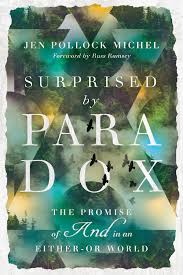Surprised by Paradox: The Promise of And in an Either-Or World
By Jen Pollock Michel
Reviewed by Landrum P. Leavell III, Th.D.
I was first drawn to the title. Len has always been a champion of “both/and” and even pushed it further to “both/and/also.” He’s also said many times that to get comfortable with Christianity, you have to get comfortable with paradox. By now you know that I’m usually in love with the books I review. Messaging with Jen, I told her that she was probably going get sick of herself by the time I get through tweeting through this book. Yeah, I loved this book.
By the author’s admission, this book began in a counselor’s office. Years of lugging the bag of sorrows of a blood relationship had taken its toll. She needed light for groping her way out of this tunnel with two exits—basically suffer or sever. In a “Sweetish” question, the counselor asked, “What if there’s a third way?” Michel needed to find and where she had previously imagined only either and or. When you lean not on your own understanding, you find wisdom in the way of paradox.
The back cover of the book lays out its direction: “While there are certainties in Christian faith, at the heart of the Christian story is also paradox. Jesus invites us to abandon the polarities of either and or in order to embrace the difficult, wondrous dissonance of and.” The book is laid out in four parts: Incarnation, Kingdom, Grace, and Lament. Taking up the Incarnation, she refers to Jesus as “the great I AND.” “The Incarnation—the paradox of God made human—teaches us to look for God in the and.” (27) She invites readers to imagine the possibilities of and. “One important lesson of paradox is that we are not always confined to choosing between two dreaded alternatives. Faith doesn’t always divide the world into two clean halves of right and wrong. In those places of seeming paralysis… we can surrender our straightjacketed imagination and look for the creativity of the incarnate God—And the love of the great I AND.” (30)
In case you don’t take my word for it, judge for yourself from some of these outtakes:
“I began to understand that when I asked for one-word answers from God, when I wanted faith to read like instructions from Ikea, I was likely asking the wrong kinds of questions. It’s the paradox of the incarnation that reminds us God is the author of both and and.”
“God clothed Himself with flesh and wiggles His way into the world through a womb. A new Adam came to set the record straight… The I AM became the I AND, and we have seen His glory. It is a paradox…”
“A hard word can be a means of grace. When we rightly identify a wrong we suffered, when we take up courage to tell the difficult truth, the injuring party is invited to pursue more life-giving ways in the relationship. Hard words seek to heal, not to rend.”
“The gospel, as enfleshed mystery, has strong enough arms to hold slippery things, fitful things. The story of a God itself won’t be buckled down and made to sit still.”
“Grace, as another example of paradox, forces us to confront the perplexing nature of God, that He is bothering severe and loving; the gospel cannot be reduced to saccharine sentiments.”
“A book about paradox is a book about spiritual posture: the posture of kneeling under God’s great big sky and admitting that mystery is inherent to the nature of God. As soon as we think we have God figured out, we will have ceased to worship Him as He is.”
“When a bush is alight and yet alive, that’s the very place for removing our shoes. There’s a whole lot of promise in a little bit of wondering.”
“We’ve come to an unassailable confidence that mystery, by dint of inquiry and scientific effort, can be wrestled and pinned down and made to cry uncle. We are no longer victims of the unknowable… The great modern lie is one of infinite human autonomy and control.”
“The troubles we regularly bring to God might be more closely examined for what they reveal about the things we treasure, the things we most vigilantly protect, the things we cannot lose.”
“Jesus strides by, calling out the good news …the Kingdom of God is at hand. We can’t know everything that means, but by faith, we follow this Jesus, falling in step behind Him. Because the thought of flying right-side up sure sounds good.”
“Another paradox is this, that while grace is the news we most long to hear, it’s one of the hardest things to grasp in life with God.”
“‘Follow the food’ is one way of saying that the incarnation is a kind of hermeneutic of God’s story. It teaches us to embrace the material world rather than despise it. To understand something about God…we need bodies.”
“Pride is a slippery slope—but so is false humility. I can’t imagine it pleases God any more to hang our heads and shuffle through life, mumbling apologies for our gifts and passions and looking at the floor…This is not the great, mysterious and of Christ in you.”
“God’s love is surprisingly indiscriminate, His favor roving and resting upon this who seem least deserving of it. God’s Grace is evidenced in His patient pursuit of the mucking-it-up.”
“It can be the paradox of the impolite plea—this unholy wondering in the midst of suffering—that brings us face-to-face with God.”
“Lament isn’t the road back to normal. It’s the road back to faith.”
I told you. Do yourself a favor. Get it. Devour it. Then let it marinate.
You’re welcome.

